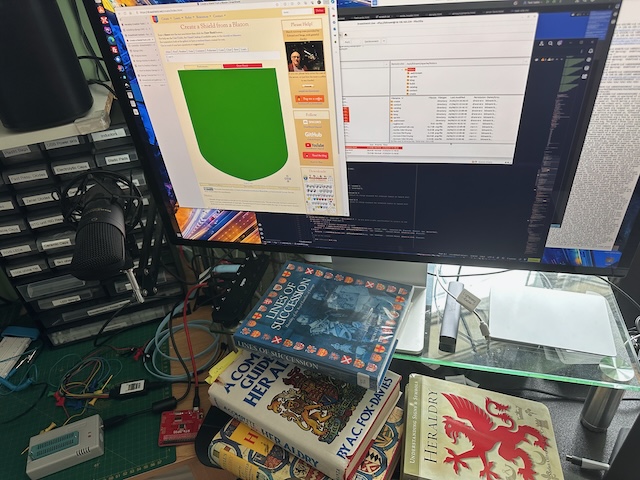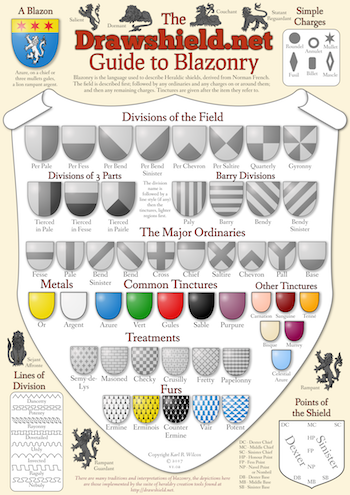Divisions
Divisions of the Cross
§5. The Cross may be of two tinctures, i.e. party per fesse, per pale, &c., or per cross, which is equivalent to quarterly(fr. écartelee), and in most cases it is so in connection with the partition of the field, and hence the tinctures are counter-changed. Though some heralds would use the term counter-quartered, the term counter-changed applied to the cross is all that is needed. The partition lines should meet in the centre in a cross and not in a saltire.



Gules, a cross per fesse or and argent--BROCKHALL.
Gules, a cross moline per pale argent and ermine--FRISKENEY, Lincoln.
Or, on a cross quarterly azure and gules five roses of the first--Thomas LANGTON, Bp. of S.David's, 1483; Salisbury, 1485; Winchester, 1493-1501.
Per bend azure and argent, a cross moline per bend or and of the first--HAWTRE, Bedford.
Per bend argent and sable, a cross potent counterchanged--ALMACK, Suffolk.
Argent, a cross pattée, per saltire, gules and azure--INGHAM ABBEY, Norfolk.
Per chevron, argent and gules, a cross counterchanged--CHAPMAN, York.
Quarterly azure and gules a cross patonce counterchanged; in first and fourth quarters a rose gules barbed and seeded or; in second and third quarters a sun glory proper--Thomas BENTHAM, Bp. of Lichfield and Coventry, A.D. 1560-79.
Quarterly argent and azure, a cross counterchanged--BEVERCOTT.
Quarterly argent and gules, a cross botonny counterchanged--CROSLAND.
Quarterly indented argent and sable, a cross counterchanged--GLENDINING.
When, however, the cross is composed as it were, of five pieces or divisions, the central being that of the field, the term quarter-pierced is used. Heraldic writers have, however, invented various terms, e.g. quarter-voided and square-pierced. And some have described the form(taking the field into account) as 'chequy of nine panes;' but it is to be noted that as a rule the pieces are charged with some device. With the French, however, the term équipollée describes the figure exactly.
Argent, a quarter-pierced cross moline sable between three crescents gules--MILWARD.
Sable, on a cross quarterly pierced argent, four eagles displayed of the first--BULLER, Bp. of Exeter, 1792-96.
Argent, five crosses croslet gules, over all on a quarter-pierced cross as the last, four crosses croslet like the second--BONNELL, London, 1691.
Ermine, on a quarter-pierced cross or four chevrons gules--City of LICHFIELD.
Cinq points d'argent équipollés à quatre de gueules--BOISY, Ile de France.
Please Help!
DrawShield is a Free service supported by its users.

If you can, please help cover the cost of the server, or just buy the team a coffee to say thanks!
 Buy me a coffee
Buy me a coffee


